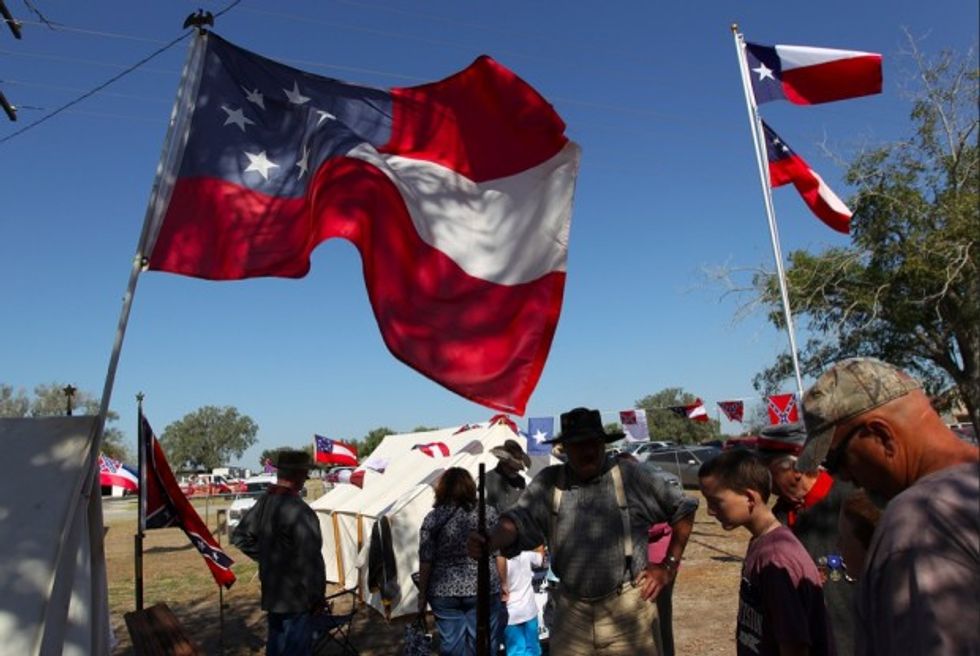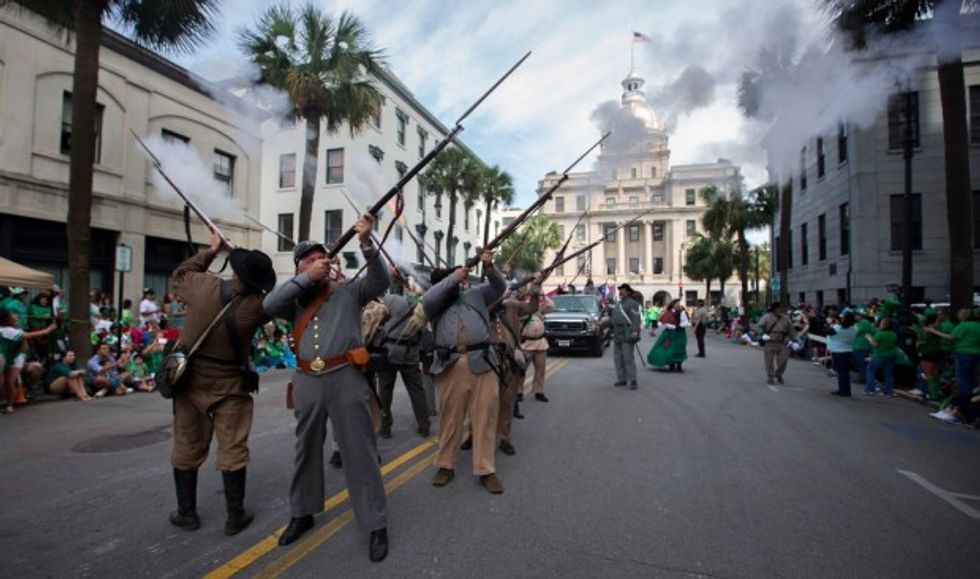
Image source: Shutterstock

The Confederate Battle Flag, carried into battle during the American Civil War, means different things to different people.
To those who hold the ideals and memories of a pre-Civil War South dear it is a symbol of defiant resolve. To those who see the Old South as racist and backwards it is an embarrassing reminder of the institution of slavery and all its diabolical tenants.
For Texans this flag represents a First Amendment test for the highest court in our land. Our current Supreme Court judges, one from the South (Clarence Thomas), six from the North (Samuel Alito, Ruth Bader Ginsberg, Elena Kagen, John Roberts, Antonin Scalia and Sonia Sotomayor) and two from the West (Stephen Breyer, Anthony Kennedy), will decide whether or not the State of Texas may deny the right of a memorial statement on a vehicle license plate in the form of a Confederate Battle Flag.
 (shutterstock.com)
(shutterstock.com)
The Sons of Confederate Veterans have brought a law suit, joined by a motley crew of others, such as the American Civil Liberties Union, anti-abortion groups, Americans United for Separation of Church and State, civil libertarian Nat Hentoff and conservative satirist P.J. O’Rourke, in an effort to force the state to allow a design, among about 250 others, to honor their view of the Old South, at the expense, some say of those who feel differently.
It is not a new concept.
The state of Georgia suffered through such a fight nearly 15 years ago when a state referendum forced out the Confederate Battle Flag as part of the state standard, which flew over the capital in Atlanta, from 1956 to 2001. Some in Georgia wanted the battle flag taken off the state flag prior to the 1996 Summer Olympics being held in Atlanta, but that legislation failed. The concern was that those from around the world attending the Olympics would get the wrong impression of Georgians from the brazen symbol of a time when slavery was the law of the land.
Today, although the battle flag is gone, the composition of the state flag of Georgia is that of the First National Flag of the Confederacy, that of the Stars and Bars. Ironically, the Texas State Flag is of the same general design.
Currently though, the state of Georgia allows the Sons of Confederate Veterans logo on state license plates. The new tags replace an older version of the license plate that also featured the Confederate flag and Sons of Confederate Veterans logo, which the state sold 439 times. There are already 35 orders for the new version, reports the Atlanta Journal-Constitution.

To this writer, who was born in Illinois, raised in California, who attended the University of Alabama, Teachers College – Columbia University in New York City, and the State University of New York at Stony Brook, and who currently resides on Long Island, New York, the Confederate Battle flag is a symbol of American history.
My great, great grandfather Freeman Woodman served in the Illinois volunteers, and was a standard bearer for the Union Army in the Civil War in Sherman’s March to the Sea. He left a diary confirming the universal soldier’s reality that war is 99 percent boredom and 1 percent sheer terror. My heritage doesn’t make me hate southerners or the symbol of their struggle. However, as a “Yankee” student at the University of Alabama in the early 1980’s I was struck by how segregated things were and by how solidly in the past some of their thinking was.
“The other side of the tracks,” was literally on the other side of the railroad tracks that ran through Tuscaloosa, Alabama, for the African American’s who lived in that city. Aside from venturing there for the best ribs in the world at Dreamland Café, most whites stayed away. Conversations overheard with the word “war” in them were almost always about the Civil War, or, as they prefer to call it, “the War between the States.”
As an occasional columnist for the campus tri-weekly newspaper, the “Crimson & White,” I wrote an article about the annual “Old South” parade down University Avenue and party, hosted by the campus Kappa Alpha Order fraternity. In order to be a member one had to prove they were a direct descendant of the Confederacy. Fascinating for a California boy with Midwestern roots.
The Kappa Alpha Order members dressed in Confederate uniforms, and their southern belle dates dressed in hoop skirts. The black “help” at the fraternity house dressed in period costumes as well and served the attendees mint julips on the porch. A huge confederate battle flag was attached to the front of the two story, Greek columned frat house for all to see.
I wrote that the display was “anti-intellectual” and did not belong at a public university if the educational institution wanted to project a modern, inclusive (read “integrated”) image. I wrote that the flag belonged in a museum, not on full display in a parade or on a frat house two stories high.
I said, “The South is what the South was, but will never be the same.”

I got anonymous death threats. I got supportive calls, too, one from each of the black fraternities on campus.
In the end, I still feel the flag should only be on display in a museum, much like the symbols of Nazi Germany or other hate groups. We should never forget, and we should be sensitive to the feelings and sensibilities of others in our great society.
With that said, I hope the Supreme Court allows the Texas state government to decide on its own whether or not the Confederate Battle Flag should be on state license plates, as the plates are government property. I believe there should be limits to freedom of speech if that speech is generally considered to be offensive or obscene to a great many people and to the ideals of freedom and liberty. After all, perception is reality.
I personally believe that flying the Confederate Battle Flag at your home, walking down the street with one, or wearing apparel with the symbol on it should be protected speech, even though I don’t like it or believe it has a useful purpose in public society.
But a state should have the right to say what it will and will not endorse. To me, this is not a Constitutional battle, but a state’s rights issue, like when Georgia decided to end the display of the battle flag on their state standard, but then decided to allow the Sons of Confederate Veterans logo on current state license plates.
There is no questioning the love and loyalty felt by southern Americans for their country. And there should be no doubt that not all Confederate soldiers or supporters of the Southern states succession from the Union meant they were pro-slavery. Most Southerners owned no slaves, nor profited from slavery. Many Southerners had succumbed to the idea that slavery would not endure, but drew courage to fight an “invading force” from the North, bent on turning the South into a subservient colony.
Maybe a compromise could be a license plate with the Stars and Bars on it instead of the battle flag? This would be a less offensive alternative that could honor the sacrifice of Southern Americans who believed differently but whose descendants today may respect the different sensitivities of their fellow citizens of the United States of America.
I am the author of "Saving Grace at Guantanamo Bay: A Memoir of a Citizen Warrior," and three times mobilized U.S. Army Reserve Major (Retired). Blog, Facebook, Twitter @mjgranger1
–
TheBlaze contributor channel supports an open discourse on a range of views. The opinions expressed in this channel are solely those of each individual author.